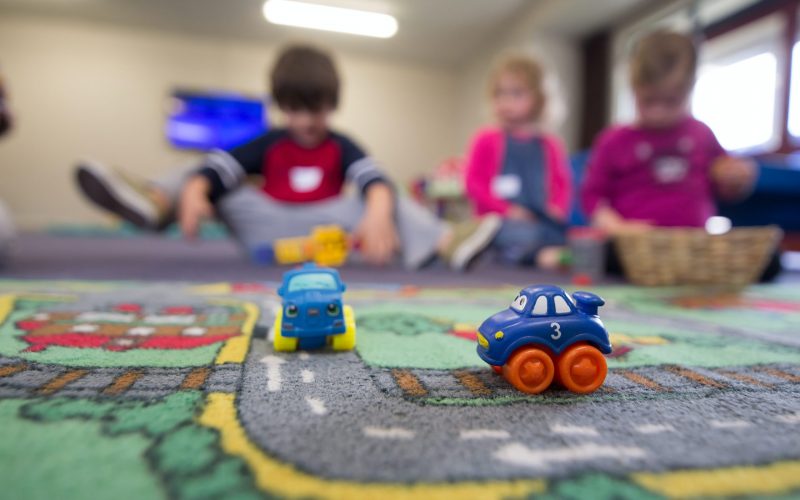As parents return to work, children across the nation are going back to school and back into the hands of caregivers, which creates an atmosphere ripe for abuse allegations (not to mention the continuous rise of QAnon). It is important for parents and caregivers to be reminded of the McMartin Trials as things return to normal post-COVID because, if McMartin teaches us anything, it is that child abuse investigations have come a long way, but there is still more to that can be done to prevent false allegations.
SATANIC PANIC
In the late 80s to 90s, preschools and daycares across the nation faced immense public scrutiny. “Satanic Panic”—a widespread conspiracy that people were being sexually and physically abused in Satanic and occult rituals—created an environment ripe for parents to believe their children were molested, physically assaulted, and forced to participate in all sorts of bizarre, untoward scenarios at their child’s daycare or preschool [1]. The molestation allegations reached their apex in 1983 and resulted in the longest and most expensive trial in California history: the McMartin Preschool Trials.
THE CATALYST
Judy Johnson had no proof McMartin preschool teacher Ray Buckey molested her son but that did not stop her from calling the police in 1983, nor did it prevent her from making allegations against other employees at the preschool [2]. And, though they lacked the evidence to prosecute Ray, the police pursued Johnson’s allegations that the preschool staff were perpetrators of crimes ranging from child pornography to orgies in secret underground tunnels [3]. Although Johnson would later be diagnosed with paranoid schizophrenia, her allegations jumpstarted seven years of litigation and triggered national panic over the safety of daycare facilities. After the trials concluded in 1990 with no convictions, law enforcement reevaluated how they investigated child abuse and states reviewed their CAPTA required mandatory reporting statutes.
THE INVESTIGATION
“Please question your child to see if he or she has been a witness to any crime or if he or she has been a victim” read the letter the Manhattan Beach Police Department sent to the parents of 200 students at the McMartin school [4]. These letters caused McMartin parents to demand an investigation into the allegations against Ray and the school. In response, the District Attorney hired Children’s Institute International (CII) consultant Kathleen MacFarlane to interview current and former preschoolers.
It should be noted that MacFarlane was not a licensed therapist of any type in the United States nor was she licensed in California as a social worker [5]. Nevertheless, using questions designed to elicit allegations, puppets, and anatomically correct dolls, MacFarlane encouraged children to show her “yucky secrets” and to admit to being abused. MacFarlane’s coercive interviewing techniques resulted in 384 out of around 400 students to be deemed a victim of sexual abuse [6]. A sampling of MacFarlane’s leading and information-seeking questions is provided below [7]:
– “We know about that game […] cause we just have had . . . twenty kids told us about that game . . . . . Do you think if I ask you a question, you could put your thinking cap on and you might remember?”
– “Can you remember the naked pictures?” […] “Why don’t you think about that for a while, okay? Your memory might come back to you.”
– “Do you think some of that touching that – Mr. Ray might have done some of that touching? Do you think that’s possible?”
Ultimately, only McMartin preschool teachers Ray Buckey and his mother, Peggy, went to trial after an exhaustive preliminary hearing led to charges being dropped against the five other defendants. Although some of children testified in open court, the lack of substantive evidence (no photographs or secret tunnels were located) and the clear manipulation of the children during the interview process resulted in Ray and Peggy’s acquittal in 1990 [8].
CHANGES IN POLICE INVESTIGATIONS AND INTERVIEW TECHNIQUES
Today, the letter that the Manhattan Beach Police sent to the parents of McMartin students would never have happened. Since McMartin, there has been an increased awareness about how letters of such a salacious and alarming nature would trigger panic in any reasonable parent. Now, any allegations of child abuse by staff would be handled delicately and discretely and in accordance with the CAPTA requirement that child abuse and neglect records are confidential [9].
Now, the Department of Child Services (DCS) often interviews children before their parents are even aware there has been an allegation of abuse and puppets and dolls are used sparingly, if at all. The DCS Program Policy in Arizona specifically requires interviews to take place in a safe and neutral location, if possible, to help ensure the child is not coached to respond a certain way. While these changes certainly help minimize false allegations, it has not eliminated them.
To this day, the impact of McMartin lives on, as daycares are still susceptible to child abuse allegations and some states, including Arizona, have lawyers that advertise themselves as “Daycare & After-School Sexual Abuse Lawyers.”
[1] https://www.nytimes.com/2021/03/31/us/satanic-panic.html
[2] https://books.google.com/books?id=qnBYYsw9VaUC&lpg=PA5&ots=taWZOnhIbi&dq=mcmartin%20preschool%20trial (Ray Buckey also happened to be the twenty-five year old grandson of McMartin preschool founder Virginia McMartin and the son of Peggy Buckey, the preschool Director. All three, in addition to Ray’s sister and three other teachers, faced child abuse allegations; Judy Johnson’s allegations became more erratic over time, resulting in a diagnosis of paranoid schizophrenia, which prosecutors kept hidden from the defense and the press).
[3] http://law2.umkc.edu/Faculty/Projects/FTrials/mcmartin/mcmartinaccount.html
[4] Id.
[5] http://ipt-forensics.com/journal/volume7/j7_2_1_4.htm
[6] https://scholarworks.utep.edu/cgi/viewcontent.cgi?article=1014&context=james_wood. (A sample interview with a child demonstrates statements such as “You must be dumb” and “I heard from several different children that they took their clothes off” were used to elicit abuse allegations. Additionally, about half of the children were “confirmed” sexually abused after a medical examination. The doctor who conducted these examinations said her conclusions were based not on physical evidence but on the children’s “medical histories and her belief that ‘any conclusion should validate the child’s history.’”)
[7] https://famous-trials.com/mcmartin/910-sampleinterviews
[8] http://law2.umkc.edu/faculty/projects/ftrials/mcmartin/mcmartinchrono.html
[9] https://www.childwelfare.gov/pubPDFs/confide.pdf
Gregg Woodnick has been practicing law in Arizona for over 20 years. He is a former adjunct law professor and has lectured for Yale University, Midwestern College of Osteopathic Medicine, Arizona State University and Northern Arizona University.
Isabel Ranney is a law student at the Sandra Day O’Connor College of Law at Arizona State University, Associate Editor for the Law Journal for Social Justice, and clerk at Woodnick Law.



